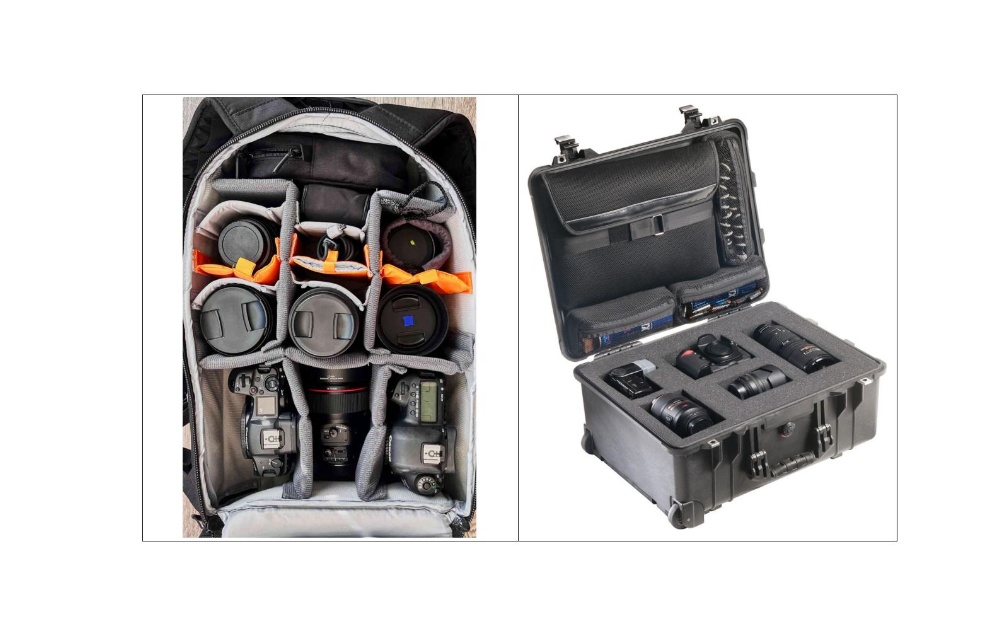For photographers—whether amateur hobbyists or seasoned professionals—keeping camera gear safe, organized, and accessible is a top priority. Two popular storage and transport solutions are camera cases and camera bags. Though they serve a similar purpose, they differ in construction, use cases, and convenience. Understanding their pros and cons can help you make the right choice based on your shooting style and environment.
What Is a Camera Case?
A camera case typically refers to a hard-sided protective container made from materials like aluminum, plastic, or composite resin. These cases are designed to provide maximum protection against impact, water, dust, and pressure. They're often used for storing expensive DSLR or mirrorless cameras, lenses, and other sensitive gear.
Pros:
Superior Protection: Resistant to shocks, water, and dust—ideal for travel or harsh environments.
Secure Locking: Many feature latches, combination locks, or padlocks for extra security.
Custom Foam Inserts: Gear stays snug and organized with customizable compartments.
Stackable & Durable: Perfect for air travel, fieldwork, or shipping gear safely.
Cons:
Bulkier and Heavier: Less convenient for casual use or hiking.
Limited Carrying Comfort: Usually lacks shoulder straps or ergonomic designs.
Less Flexibility: Not ideal for quick access or on-the-go adjustments.
What Is a Camera Bag?
A camera bag is a soft-sided carrier made from nylon, canvas, leather, or polyester. These bags are designed for portability and ease of access, often featuring adjustable dividers, padded interiors, and multiple compartments for accessories.
Pros:
Lightweight and Comfortable: Great for day trips, urban photography, or travel.
Easy Access: Zippers and flaps allow fast gear retrieval when shooting on the move.
Variety of Styles: Includes backpacks, messenger bags, sling bags, and shoulder bags.
Additional Storage: Often has space for laptops, batteries, SD cards, and personal items.
Cons:
Less Protective: Not fully waterproof or crush-resistant in most cases.
Wear Over Time: May lose shape and cushioning with frequent use.
Security Risks: Easier to open or tamper with compared to hard cases.
Which One Should You Choose?
| Use Case | Recommended Option |
|---|---|
| Traveling by air or shipping gear | Camera Case |
| Everyday city photography | Camera Bag |
| Outdoor shoots in rough terrain | Rugged Camera Case |
| Event or street photography | Lightweight Camera Bag |
| Studio gear storage | Camera Case |
| Hiking or long walks | Camera Backpack (Bag) |

Conclusion
Both camera cases and camera bags offer unique advantages depending on how, where, and what you shoot. If maximum protection and organized transport are your priorities, a hard camera case is the best choice. If you need mobility, accessibility, and comfort, a camera bag offers versatility for day-to-day photography.
Many photographers end up owning both—a rugged case for storing and transporting gear, and a soft bag for carrying essentials while out shooting.
KASSICO, a leading custom case factory in Ningbo, China. Have 24 years' production experience in manufacturing custom plastic case, aluminum storage boxes, aluminum tool box, coolers for outdoors, camping, overlanding, military, medical etc. We supply full custom service, including developing OEM & ODM projects. Our company owns 15000m2 factory area and more than 200 sets of advanced manufacturing equipments. Perfect and rigorous QC system is implemented in every process from material purchasing to finished products packaging.
 English
English Arabic
Arabic Danish
Danish French
French German
German Japanese
Japanese Korean
Korean Norwegian
Norwegian Portuguese
Portuguese Russian
Russian Spanish
Spanish
